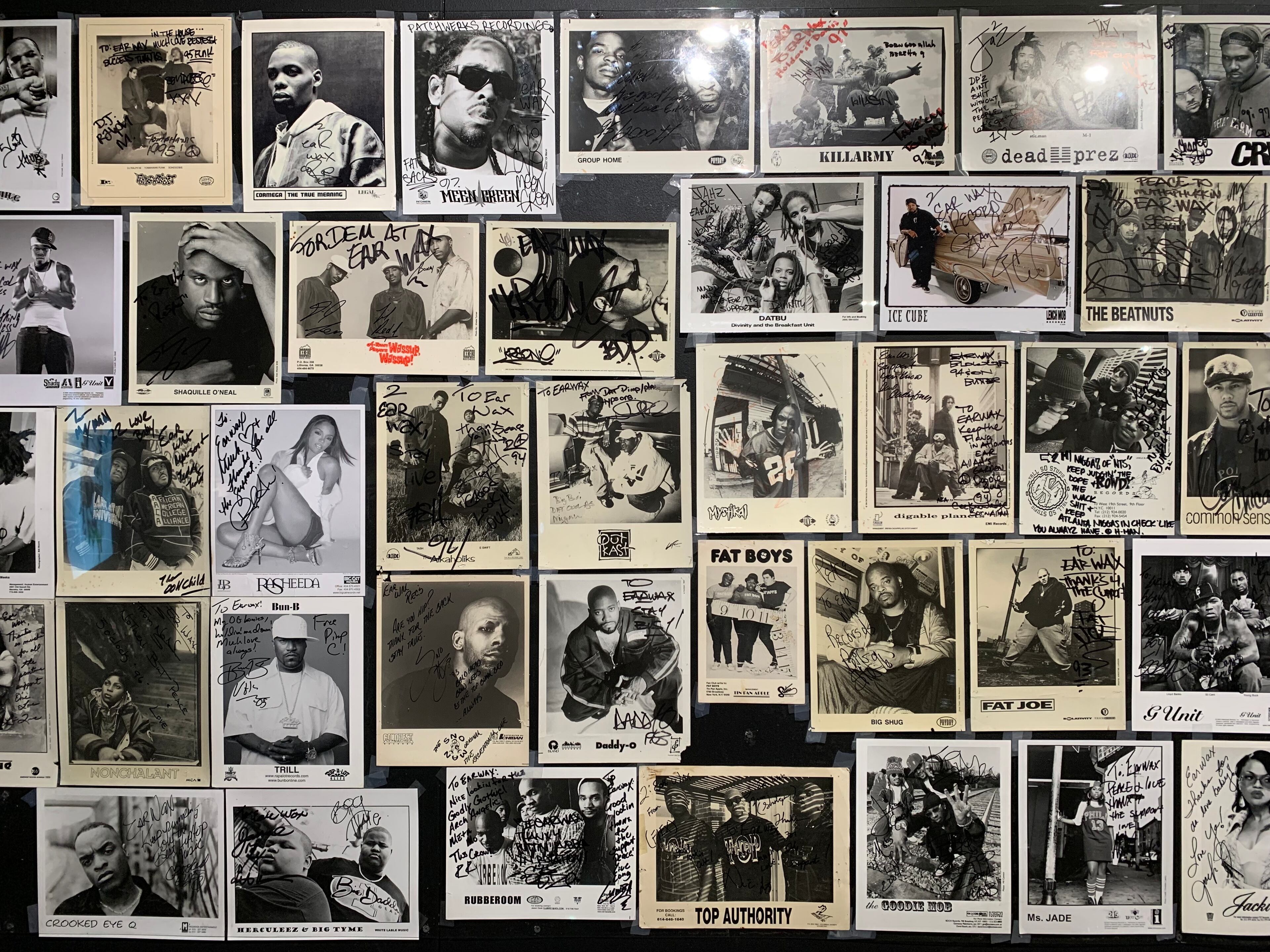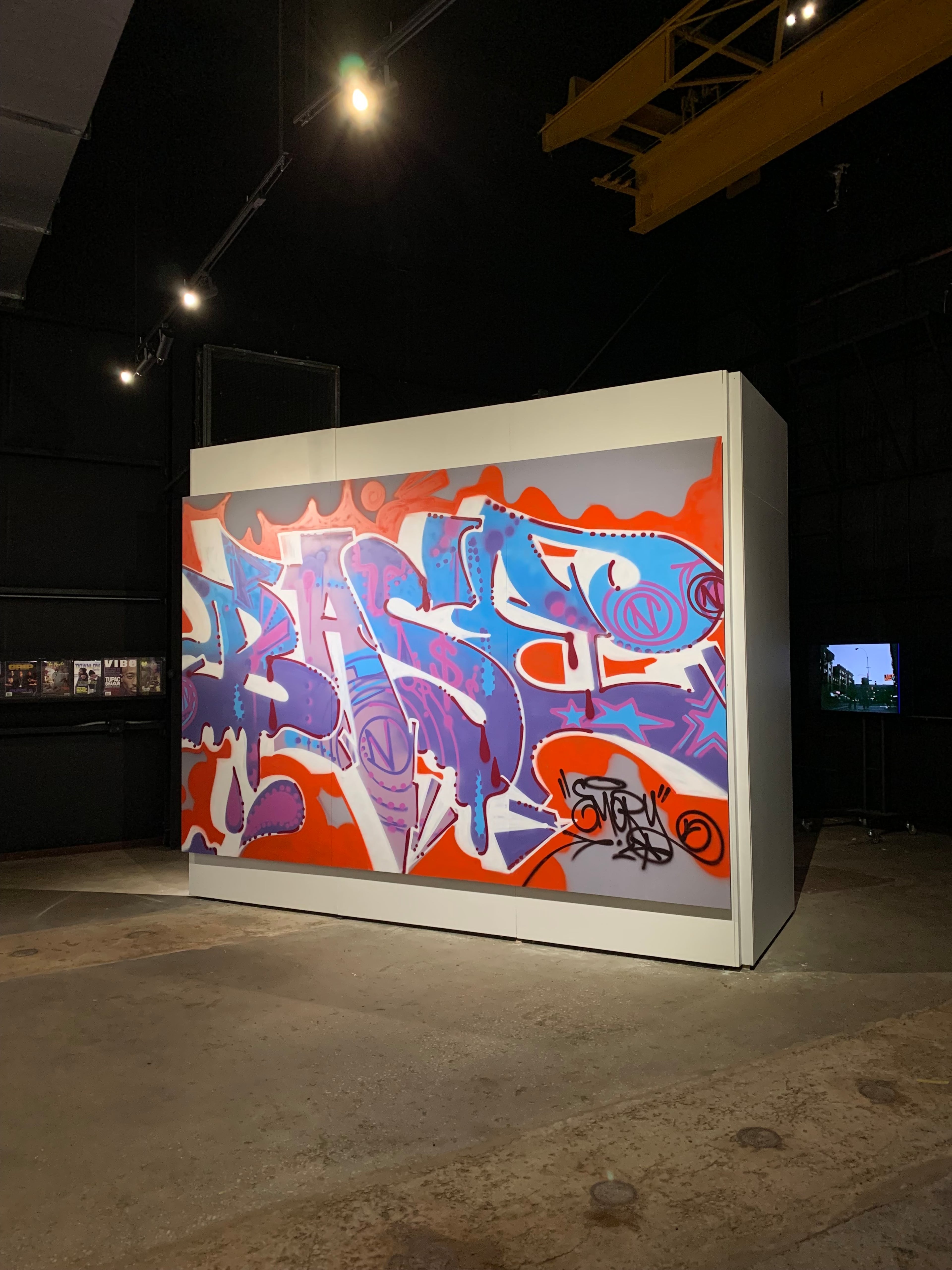Spotlighting EarWax Records’ impact on Atlanta’s hip-hop scene

Darryl “Jasz” Smith was growing frustrated with the celebrations for hip-hop’s 50th anniversary. Smith wasn’t happy with what he felt is a milestone marked by celebrations focusing in on specific regions, major events curated by those who didn’t grow up in the culture. The former owner of Atlanta’s EarWax Records was disgruntled.

During one of his rants about what the hip-hop 50 ceremonies lacked, a friend challenged him. “He said, ‘you going to sit down and shut up or you going to do something’,” he recalls. “That’s what it boiled down to, I either needed to sit down and be quiet or get up and do something.”
Smith has earned the right to gripe. He is one of the rare locals who can say he has been witness to — and had a hand in shaping — hip-hop culture. The 62-year-old DJ, collector and music historian is older than hip-hop.
He came to Atlanta from New York in 1987. Six years later, he opened EarWax Records on Peachtree Street in Midtown. Known for its familial community vibe, hard-to-find vinyl collection, and loyal clientele, EarWax’s run on Peachtree Street ended in 2002. There was another iteration of the shop on Spring Street, but it closed in 2007.
That feeling of digging through crates at EarWax during ‘90s Atlanta with Jack the Rapper, Freaknik, and OutKast album signings comes alive through artifacts on display at “You Don’t Got Dis: A Hip Hop Legacy,” an exhibition at the Science Gallery Atlanta. Working with Science Gallery curator Floyd Hall, artist Fahamu Pecou and Emory University, Smith channeled his frustration into an exploration of his world. What does that look like? Think a wall stretching the width of over 280 vinyl album covers, TV sets playing MTV’s “Yo! MTV Raps” and BET’s “Rap City,” concert posters, and Walkman cassette players.

“This is not an Atlanta exhibit, this is not a New York exhibit,” he said. “You’re going to see Uncle Luke, you’re going to see Three Six Mafia, you’re going to see Bun B. This is about covering all of that.”
‘It won’t fit in my coffin’
A few years ago, before the idea for a gallery show emerged, Smith conversed with Pellom McDaniels, curator of African American collections at Emory’s Stuart A. Rose Manuscript, Archives, and Rare Book Library. Smith was eager to share his rare collection of vinyl and papers from EarWax, but the two men never met in person because McDaniels died unexpectedly. Fortunately, Smith connected with Clint Fluker, who took over McDaniels’ role as curator. Fluker went to Smith’s house in Decatur to see his trove of hip-hop grails.
Emory has two archived collections with Smith’s vinyl and hip-hop memorabilia. Before reconnecting with Fluker, Smith contacted Pecou for honest feedback about this idea to honor EarWax and his love for hip-hop culture in gallery form. Pecou, who was in the same Ph.D. program as Fluker at Emory, reached out to his former classmate and told him about Smith’s idea.
In Fluker’s current role as inaugural senior director of culture, community and partner engagement for the Michael C. Carlos Museum and Emory Libraries, he facilitates partnerships between the university, city, and other institutions throughout metro Atlanta. At the encouragement of Valeda Dent, he spearheaded Emory’s involvement in hip-hop 50 celebrations locally.
Fluker, impressed by Hall’s previous work at the Science Gallery, brought the curator in on the project. The team behind the exhibition met for the first time in September, initiating five weeks of work that culminated in “You Don’t Got Dis.”

The first installation you see is a pop-up EarWax Records shop with its signature neon sign and crates filled with vinyl records for purchase. From there, visitors set out into an open space highlighted by a visual art installations from documentary photographer John Crooms, curated by Kemi Bennings, celebrating Atlanta’s Black arts movement. There’s a throwback living room space decked out with old FUBU jerseys, CD cases and vintage posters from hip-hop hoarder Nuface. There is even an homage to Atlanta’s nightclubs, record stores, radio stations, and scenes that shaped its early aughts.

“I think from an exhibition design standpoint, the intent was to take the concept of a record store and then just explode it,” Hall said. “I think one of the things that is so unique about this space is that there’s a level of authenticity about what is being displayed. These aren’t reproductions of things. Most of these are the things that were part of Jasz’s world.”
Smith’s world is one where, as he gets older, there is genuine concern about the legacy of who preserves the culture he is still giving his life to. He mentions Atlanta music legend and “American Music Makers” host Arnell Starr, whose prized possessions, Smith said, ended up in a landfill after he died. That’s Smith’s nightmare.
“It won’t fit my coffin, can’t take it to the grave with me,” he said. “My children can’t place this stuff like I can. I’ll sit up in my grave if all my stuff ends up in the landfill. If I don’t do something intentional with it, that may be what happened.”
‘A forgotten gem’
In its prime, EarWax was a hub for Black culture in Atlanta. “EarWax was always a landmark,” said Hall who remembers going to the shop for a meet and greet with R&B singer Mya. “We don’t always recognize how Atlanta is shifting. When things shift, the landmarks shift.”
Fluker says that while the vision for the exhibition conjures up those feelings of back when, it’s also a chance to educate leaders for hip-hop’s next 50 years. “It’s an exercise in continuing to collect this history, such that it can be here for future generations who might not have experienced EarWax,” he said. “This is an opportunity for them to get that introduction and learn about the history that led to where we are in Atlanta right now and in the future.”

Smith says in both local and national conversations about hip-hop, the influence of record stores in building and sustaining creative communities is constantly overlooked. He is glad to see Wax ‘n’ Facts and DBS Sounds still going. He recently sold more than 5,000 jazz vinyl to Criminal Records. He has over 3,000 hip-hop records to his name, including the hundreds mounted on a wall in Science Gallery to honor of McDaniels for this exhibit.
50 Years of Hip-Hop: Celebrating Atlanta’s influence
This year marks the 50th anniversary of hip-hop. Read our coverage on how Atlanta impacted the genre:
AJC Film: “The South Got Something To Say,” a new feature documentary from The Atlanta Journal-Constitution chronicles the rise of Atlanta hip-hop and its journey to dominance. Watch the film at ajc.com/hiphop, where it is streaming for a limited time.
Learn more about the film’s backstory: AJC hip-hop doc chronicles evolution of Atlanta’s cultural dominance
Read the oral history of ‘the South got something to say’ by Ernie Suggs and DeAsia Paige, tracing the lasting effects from André 3000′s famous declaration at the 1995 Source Awards
Take a look at our list of the 50 greatest Atlanta hip-hop hitmakers and our round-up of the 50 songs that define Atlanta hip-hop. By a passionate crew of hip-hop fans at the AJC.
How exactly did Atlanta become the nation’s rap capital? Here’s a brief history of Atlanta’s rise in hip-hop. By Najja Parker.
Remember Atlanta pioneers Silk Tymes Leather? One member of the female rap group doesn’t want people to forget their legacy. By DeAsia Paige.
Read more of our coverage on how Atlanta influenced hip-hop.
Still, Smith in his blunt assessment of the oversight to not include EarWax and others in all the flowers being handed out to those credited with building the culture. “Let’s keep it 100. I think EarWax is a forgotten gem,” he said. “I mean, what documentary or anything you seen EarWax or me in?”

During a VIP reception for the exhibition, Smith was presented with a proclamation from the City of Atlanta for his work with EarWax and other contributions. He says the success of EarWax was never about him. “That time in Atlanta, you can’t recreate that, he said. “So many people met and built relationships. That location will never be on that real estate again. Everything has its time and space and we move on into other times and spaces.”
EXHIBITION PREVIEW
“You Don’t Got Dis: A Hip Hop Legacy”
Through Jan. 7. 10 a.m.-5 p.m. Wednesdays-Sundays. Free. Science Gallery Atlanta, Pratt-Pullman Yards, 225 Rogers St. NE, Atlanta. atlanta.sciencegallery.com/visit.


